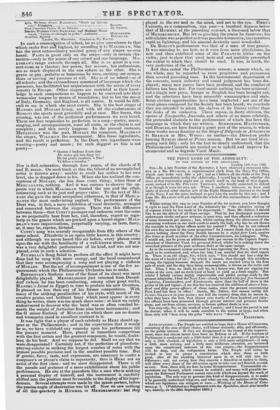THE FIRST LORD OF THE ADMIRALTY. .
TO THE EDITOR OF TIIE SPECTATOR.
London, 11th June 1933.
Stn—In a late Number of the Spectator, I have observed a statement rela- tive to a Mr. BEAMISH, a superannuated clerk from the Navy Pay Office, which ease looks very like a job ; and as I believe all the clerks of the Navy Office are immediately under the Admiralty, I would beg to ask, whether the onus of that transaction ought not to attach itself to the head of that depart- ment, instead of to Mr. POCLETT THOMSON, who kindly undertook to defend it as though it were his own act. When I recollect, however, to have read lately of several other similar acts of the Right Honourable Baronet at the bead of the Navy, I am the more inclined to give him the credit for this one : and I hope Mr. BEAMISH will yet explain the whole of this extraordinary affair to the public. Whilst stating this case in your Number of the 1st instant, you have thought it right to laud the First Lord of the Admiralty for "the extensive saving of of expense which he has made in his department." Now, Mr. Editor, I should like to see the details of all those savings. That he has discharged numerous unfortunate clerks and.poor artisans, is most true, and thus effected a reduction of some thousands per annum ; but, whilst cutting down the allowances of the remaining workmen in our dock-yards to nearly the half, why has he not shown the example in the higher offices under his control ? Why has he not reduced his own fine income in the same proportion? for I cannot think that a man who knows nothing about the Navy should, because he is styled first Lord, receive five times as much as either of the other Commissioners, his colleagues. Why, I would ask, has he given an additional 1001. per annum to the Captain Super- intendent of Sheerness Yard, his personal friend, whilst he is cutting down the wretched pittance of the poor artificers there at the same instant.
As to the economical system pursued by him regarding the Navy, there is very
much to be condemned, and, when too late, I am assured that we shall repent it. There is an old adage, Sir, which says, " You should not lose a ship for the want of a bucket of tar ;" by which is meant, that through this mistaken saving, the rigging becomes decayed, the masts are carried away in the first gale of wind, and the ship then being unmanageable, is driven on the rocks and lost. Thus, I fear, we shall, by and by, in a future war, find our rigging too rotten at the core, and no dock-yard at hand to yield us a fresh supply. But whilst I behold various highly objectionable and pitiful savings made by the present Admiralty, I find the Navy List—already brimful with just five thousand Captains, Commanders, and Lieutenants, more than the half of them in the prime of life and vigour—I see this list has received the addition of above a hun- dred and fifty young officers of these ranks, since the present economizing First Lord has been in office ! Surely, Mr. Editor, this cannot entitle Sir JAMES GRAHAM to your praise; nor will the country deem that he merits it, when they learn the fact, that almost nine tenths of these hundred and sixty- five officers have been promoted through private interest and personal favour alone, and not from claims, services, or former gallant deeds in war. You may rely, Sir, on the truth of what I assert; and I trust the period is not far distant, when it will be made manifest to the nation at large, and when those only will "bear away the palm " who HAVE "deserved it."






















 Previous page
Previous page